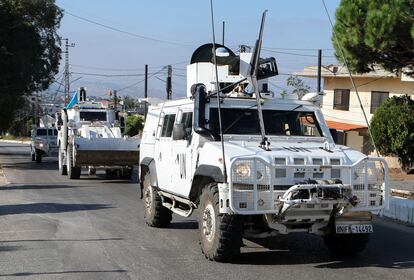Israel in Lebanon, better without witnesses
The Israeli army did not mistakenly target the Blue Helmets; it acted deliberately to eliminate inconvenient observers

When the Israel Defense Forces (IDF) commit acts that contravene international law, such as the recent attacks on the headquarters of the United Nations Interim Force in Lebanon (UNIFIL) and several of its observation posts along the Blue Line (the border between Israel and Lebanon), a predictable series of actions unfolds — one that has become tiresomely familiar and largely ineffective.
Israel typically announces an internal investigation to determine what transpired, fully aware that the outcome will likely portray the incident as a tragic mistake. Meanwhile, the U.N. condemns the attacks but lacks the power to take further action, as Washington will go to great lengths to shield its key ally in the region from repercussions. Governments like those of Spain, France, and Italy may summon the Israeli ambassador to express their discontent, yet they stop short of withdrawing their own ambassadors from Tel Aviv or reevaluating their relations with a country that has for too long disregarded the most basic tenets of international law without facing any consequences.
In this situation, the only recourse left to avoid being fed a series of falsehoods is to reiterate that what occurred was anything but a mistake. Israel is fully aware of the locations and movements of UNIFIL troops, as the international peacekeeping force is obligated to inform the IDF promptly for its own safety. Additionally, Israel possesses the necessary protocols and technology to ensure that its units operating in Lebanon know with absolute precision where the blue helmets are stationed at all times and what weapons they possess. The only rational conclusion to draw from this well-established reality is that the IDF did not accidentally fire upon UNIFIL (i.e., the U.N.) but, rather, as has happened numerous times before in Lebanon, did so intentionally to eliminate inconvenient witnesses.
Nothing new, in short, for a government openly intent on establishing a new regional order. As far as Lebanon is concerned, this means at least clearing the 800 square kilometers between the common border and the Litani River, where the majority of Hezbollah’s troops are stationed. In the short time since the commencement of the new invasion, the IDF has already observed that, despite Hezbollah’s politically and militarily weakened state, the group still possesses both the capacity and the will to fight. Consequently, Israel’s Northern Arrows operation is unlikely to be a straightforward endeavor. Israel calculates that overcoming the resistance posed by fighters who are intimately familiar with the terrain and have spent years preparing for this confrontation will only be feasible if, once again, it exceeds the limits established by the laws of war.
Opacity — illustrated by actions in Gaza such as killing journalists or preventing them from accessing combat zones — thus becomes a fundamental condition for accelerating the pace of military advance without having to consider humanitarian concerns or the conduct expected from an army that calls itself the most moral on the planet.
One can only hope that Israeli pressure does not result in the withdrawal of UNIFIL, as this would further play into Israel’s hands and completely undermine the little international dignity that remains.
Sign up for our weekly newsletter to get more English-language news coverage from EL PAÍS USA Edition
Tu suscripción se está usando en otro dispositivo
¿Quieres añadir otro usuario a tu suscripción?
Si continúas leyendo en este dispositivo, no se podrá leer en el otro.
FlechaTu suscripción se está usando en otro dispositivo y solo puedes acceder a EL PAÍS desde un dispositivo a la vez.
Si quieres compartir tu cuenta, cambia tu suscripción a la modalidad Premium, así podrás añadir otro usuario. Cada uno accederá con su propia cuenta de email, lo que os permitirá personalizar vuestra experiencia en EL PAÍS.
¿Tienes una suscripción de empresa? Accede aquí para contratar más cuentas.
En el caso de no saber quién está usando tu cuenta, te recomendamos cambiar tu contraseña aquí.
Si decides continuar compartiendo tu cuenta, este mensaje se mostrará en tu dispositivo y en el de la otra persona que está usando tu cuenta de forma indefinida, afectando a tu experiencia de lectura. Puedes consultar aquí los términos y condiciones de la suscripción digital.








































